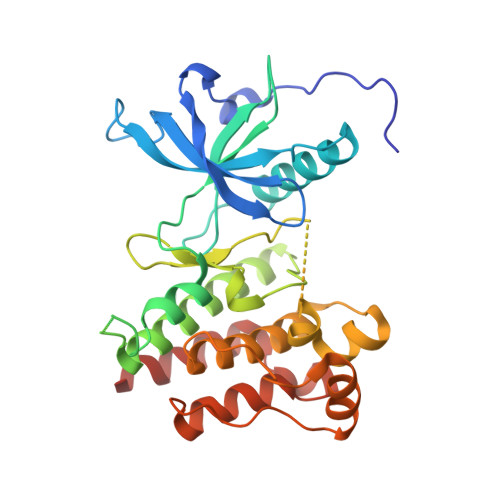Discovery of TYRA-300: First Oral Selective FGFR3 Inhibitor for the Treatment of Urothelial Cancers and Achondroplasia.
Hudkins, R.L., Allen, E., Balcer, A., Hoffman, I.D., Iyer, S., Neal, M., Nelson, K.J., Rideout, M., Ye, Q., Starrett, J.H., Patel, P., Harris, T., Swanson, R.V., Bensen, D.C.(2024) J Med Chem 67: 16737-16756
- PubMed: 39258897
- DOI: https://doi.org/10.1021/acs.jmedchem.4c01531
- Primary Citation of Related Structures:
9CD5, 9CD7 - PubMed Abstract:
Activating FGFR3 alterations have been identified in up to 15-20% of muscle-invasive bladder cancer and metastatic urothelial carcinoma (mUC), and as high as 80% in nonmuscle invasive bladder cancers. FGFR3 germline mutations have also been associated with a variety of skeletal dysplasias. Achondroplasia, the most common form of dwarfism in humans, results from a G380R mutation in FGFR3. The pan-FGFR inhibitor erdafitinib was approved for the treatment of mUC with FGFR3 alterations but is limited due to FGFR isoform off-target toxicities and the development of on-target gatekeeper resistance mutations. TYRA-300 ( 22 ) was conceived using a structure-based approach as a potent FGFR3-selective inhibitor to avoid the toxicities associated with inhibition of FGFR1, FGFR2, and FGFR4, and to be agnostic for the FGFR3 gatekeeper mutations. TYRA-300 is being evaluated in a Phase 1 clinical trial in urothelial cancers and solid tumors, with intention to initiate Phase 2 studies in urothelial cancers and achondroplasia.
Organizational Affiliation:
Tyra Biosciences, Inc., 2656 State Street, Carlsbad, California 92008, United States.

















